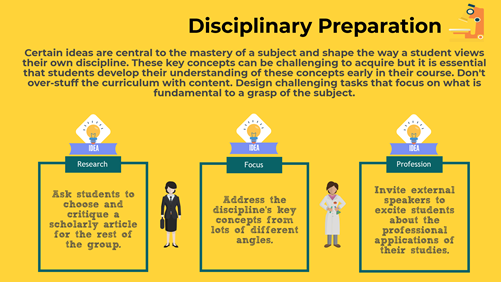Leeds Beckett University - City Campus,
Woodhouse Lane,
LS1 3HE
discipline preparation
New students bring with them a variety of previous subject knowledge and experience, but, even where a student has had previous exposure to their subject, it is possible that they have not internalised the key concepts of the discipline.
Certain ideas are held to be central to the mastery of a subject (Meyer & Land, 2003) and shape the way a student views their discipline. These key or ‘threshold’ concepts can be challenging to acquire but it is essential that students develop their understanding of these concepts early in their course. In the early stages of a course in particular, care should be taken not to over-stuff the curriculum with content (Cousin, 2006) and to focus, instead, on what is fundamental to a grasp of the subject.
Assessment design is a significant driver in shaping student activity, and designing authentic tasks can go some way to providing opportunities for acquisition of threshold concepts. Authentic tasks, which are perceived by students to have real-world relevance and which support them to develop skills that they perceive to be relevant in the workplace, can effectively engage students in learning though helping them contextualise and apply their studies.
Creating an intellectual disciplinary environment that stimulates discovery, debate and challenge increases curiosity and encourages students to invest in their studies. Appropriate intellectual challenge has been linked to general increases in the levels of student engagement (Trowler, 2010, National Survey of Student Engagement [NSSE], 2002).

- Jim Durrant - Project biased learning for applicant days
- Killian Ngong - Developing discipline based thinking
- Emlyn Butterfield - Engaging challenges at L4
- Rachel Rich - Portfolios to develop independent learners

